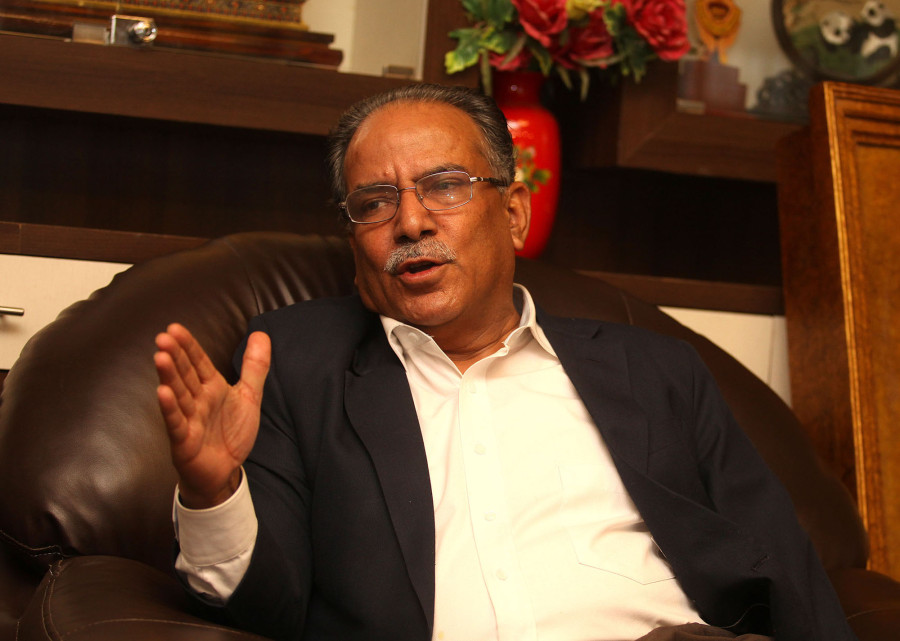Politics
It is politics as usual with Dahal back to making cryptic statements
Statements made by ruling party Co-chair Pushpa Kamal Dahal at a Congress tea reception has left many wondering if he seeks support from the opposition, or perhaps from across the border.
Tika R Pradhan
Hours after Chinese President Xi Jinping left for Beijing after concluding his two-day state visit to Nepal, the country’s politics was back to the humdrum.
Immediately after the excitement over the high-level visit from the north died down, the first political session started at a tea party hosted by the Nepali Congress, a routine event that the party organises during Dashain. But it was ruling Nepal Communist Party Co-chair Pushpa Kamal Dahal who stole the show with statements that left enough room for speculation.
“I see quite some excitement here among Nepali Congress [members],” said Dahal. “I feel like being with my co-workers. Let’s see how politics takes a turn [in the future].”
Dahal went on to say that “nothing is impossible in politics” and “anything that looks impossible can be made possible through cooperation among political parties.”
When journalists asked Dahal to clarify what kind of cooperation he was talking about between a government with a two-thirds majority and the primary opposition, he, in turn, asked them not to talk about the majority.
Dahal’s statement received applause from the Nepali Congress leaders, while it piqued interest among ruling party leaders as well as some political watchers.
Some believe Dahal is not happy with the non-implementation of an agreement he had reached with Prime Minister KP Sharma Oli at the time of party merger.
A deal between Prime Minister Oli and Dahal had it that the two would run the government in turns, and the latter has said in public that he is optimistic about the deal’s implementation.
Oli, however, has not only been running the government by himself, but he did not even let Dahal lead party meetings until last month when he had to go to Singapore for treatment.
“When there is an internal problem in the party, one may make some unexpected statements out of frustration just to shore up one’s bargaining power,” said Rajendra Maharjan, a political commentator. “But if we go by the pattern, it seems his statement has some context.”
Many within the ruling party believe that Dahal is setting his sights on the party leadership and not on the government. But if there comes an opportunity to lead government, Dahal will seize it, they say.
That’s why his statement at the Congress tea party has left some wondering whether he is seeking support from the Congress.
Maharjan, however, does not believe that Dahal will break the existing equation anytime soon.
Dahal’s relationship with the parties—the Congress and the former CPN-UML—has always been inconsistent.
In 2016, Dahal’s Maoist party had supported Oli’s UML government. A gentleman’s agreement required Oli to hand over the reins of government to Dahal, but when Oli refused, Dahal ditched the UML, joined hands with the Nepali Congress and unseated Oli to become prime minister.
But Dahal also joined hands with the Congress because of the transitional justice process. There was an understanding between Oli and Dahal over how cases against Maoist leaders would be withdrawn while taking the transitional justice process forward. But the Oli government remained noncommital, irking Dahal. There appears to be some sort of unanimity between Dahal and Nepali Congress President Sher Bahadur Deuba when it comes to transitional justice, as they both are parties to it. Dahal even earned a lot of praise for abiding by his promises when he handed over the mantle to Deuba after seven months in power.
The Deuba-led government, supported by the Maoist party, oversaw the 2017 parliamentary and provincial elections. But by that time, Dahal had already formed an alliance with Oli. The two communist forces swept the elections. Two months after government formation, both parties announced a merger.
“But some issues, including work division for top leaders, have yet to be finalised,” said Devendra Poudel, a standing committee member of the ruling party. “Maybe Dahal made the statements out of frustration.”
Leaders who have close relations with Dahal have been saying that there was a general understanding between Oli and Dahal just before the former went to Singapore. It was largely believed that Oli would run the government and Dahal would lead the party.
But nothing has happened even two months after Oli’s return.
Mani Thapa, a standing committee member in the ruling party, said that it’s in Dahal’s character to play to the gallery.
“When I heard him making those statements, it looked like he was speaking out of annoyance,” Thapa told the Post. “Maybe he was trying to warn Oli.”
But who knows if Dahal was attempting to find an unexpected audience, say some commentators.
“What is the import of the statement?” said Maharjan. “It came during the visit of the Chinese president. Maybe he was trying to send a message across the border.”
Some believe that China had a hand in materialising the unity between the two communist forces and the push was made through Dahal.
“The Chinese president’s visit did not happen out of the blue. There is a certain pattern in the series of events,” said Maharjan. “Dahal’s statement looks like dissatisfaction at the non-implementation of agreements he has reached with Oli. I think Dahal wanted the Chinese to know.”




 13.12°C Kathmandu
13.12°C Kathmandu














